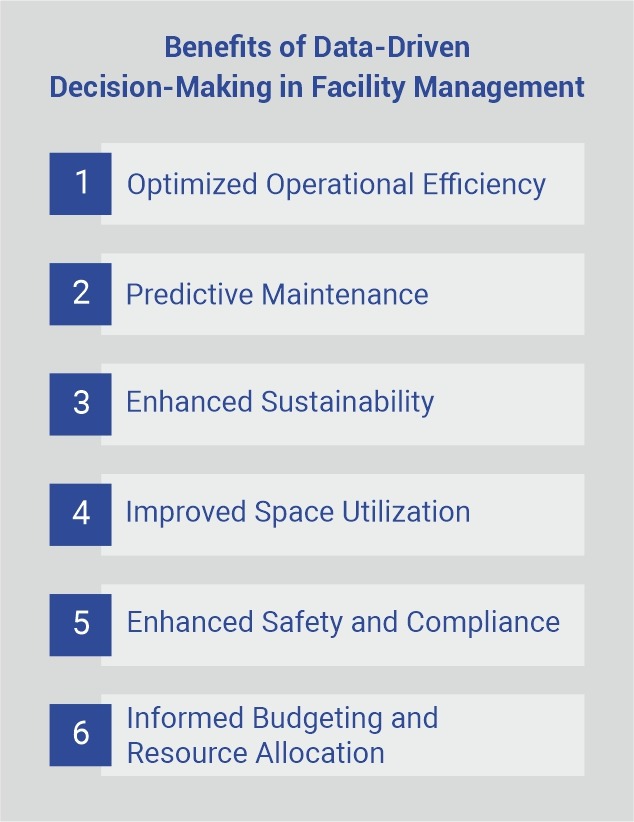Data-Driven Decision-Making in Facility Management
In the ever-evolving facility management (FM) industry in India, the ability to make informed decisions swiftly and accurately has become a critical differentiator. Gone are the days when facility managers relied solely on intuition, experience, and manual processes to oversee the complex environments they manage. Today, data-driven decision-making is transforming the FM landscape, enabling organizations to optimize operations, reduce costs, enhance sustainability, and improve overall service delivery.
The Shift toward Data-Driven Facility Management:
The adoption of data-driven decision-making in facility management is a response to the growing complexity and scale of modern facilities. Buildings and infrastructures today are equipped with various systems, from HVAC and lighting to security and energy management, all of which generate massive amounts of data. With the rise of the Internet of Things (IoT), smart sensors, and advanced building management systems (BMS), the volume of available data has skyrocketed. This influx of data, when harnessed effectively, allows facility managers to gain deeper insights into their operations and make more informed decisions.

Benefits of Data-Driven Decision-Making in Facility Management
1. Optimized Operational Efficiency:
Data-driven decision-making enables facility managers to identify inefficiencies and optimize processes. By analyzing data from various systems, managers can pinpoint areas where resources are underutilized or overused, allowing for adjustments that streamline operations. For example, data from occupancy sensors can reveal underutilized spaces, prompting decisions to reallocate or redesign those areas to better serve the organization’s needs.
2. Predictive Maintenance:
Traditional maintenance practices often rely on fixed schedules or reactive responses to equipment failures. However, data-driven approaches leverage predictive analytics to anticipate potential issues before they become critical. By monitoring equipment performance data, facility managers can identify patterns that indicate imminent failures, allowing them to perform maintenance proactively. This reduces downtime, extends the lifespan of assets, and lowers maintenance costs.
3. Enhanced Sustainability:
Sustainability is a key focus for many organizations, and data-driven decision-making plays a pivotal role in achieving environmental goals. Facility managers can use data to monitor energy consumption, water usage, and waste generation in real time. By analyzing this data, they can identify opportunities to reduce resource consumption and implement energy-saving measures. For instance, data from energy meters can be used to optimize HVAC systems, reducing energy consumption without compromising occupant comfort.
4. Improved Space Utilization:
As organizations strive to create more flexible and efficient workspaces, understanding how spaces are used is crucial. Data-driven insights can help facility managers track occupancy patterns and determine which areas are frequently used and which are underutilized. This information can inform decisions on space planning, such as reconfiguring layouts, consolidating spaces, or transitioning to activity-based working environments. Optimizing space utilization not only enhances productivity but also reduces real estate costs.
5. Enhanced Safety and Compliance:
Ensuring the safety of facility users and compliance with regulations is a top priority for facility management service providers. Data-driven decision-making can enhance safety by providing real-time information on critical systems, such as fire alarms, security cameras, and access controls. In the event of an emergency, data from these systems can be used to coordinate responses effectively. Additionally, data-driven approaches can streamline compliance reporting by automatically tracking and documenting key metrics required by regulatory bodies.
6. Informed Budgeting and Resource Allocation:
Effective budgeting and resource allocation are essential for facility management success. Data-driven decision-making provides facility managers with the insights needed to allocate resources more effectively. By analyzing historical data on maintenance costs, energy usage, and space utilization, managers can make more accurate budget forecasts and allocate funds where they are most needed. This ensures that resources are used efficiently and that financial decisions are aligned with organizational goals.
Challenges in Implementing Data-Driven Decision-Making
While the benefits of data-driven decision-making are clear, implementing this approach is not without its challenges. Facility management companies must navigate several hurdles to fully leverage the power of data.
1. Data Integration:
Facility management data often comes from a variety of sources, including BMS, IoT devices, and manual records. Integrating these diverse data streams into a cohesive system can be challenging. Facility management agencies must ensure that data from different systems is compatible and can be analyzed collectively to generate actionable insights.
2. Data Quality and Accuracy:
The effectiveness of data-driven decision-making depends on the quality and accuracy of the data collected. Inaccurate or incomplete data can lead to incorrect conclusions and poor decision-making. Facility management solutions providers must establish protocols for data validation and ensure that data collection processes are robust and reliable.
3. Data Security and Privacy:
As facility management systems become more connected, concerns about data security and privacy are heightened. Facility services managers must implement strong cybersecurity measures to protect sensitive data from breaches and unauthorized access. Additionally, they must comply with data privacy regulations, particularly when handling personal information collected from facility users.
4. Skill Gaps:
Data-driven decision-making requires a certain level of expertise in data analysis, which may be lacking in traditional facility management or housekeeping services teams. To bridge this gap, organizations may need to invest in training or hire data specialists who can interpret complex data sets and translate them into actionable strategies.
5. Change Management:
Transitioning to a data-driven approach often requires a cultural shift within the organization. Facility managers must encourage buy-in from stakeholders at all levels, ensuring that staff are comfortable with new technologies and processes. This may involve addressing resistance to change and demonstrating the tangible benefits of data-driven decision-making.
The Future of Data-Driven Facility Management
As technology continues to advance, the role of data in facility management services will only grow. Emerging trends such as artificial intelligence (AI), machine learning, and advanced analytics will further enhance the ability of facility managers to make data-driven decisions. AI-powered tools can analyze vast amounts of data in real-time, providing predictive insights and automating routine tasks. This will allow facility managers to focus on more strategic aspects of their roles, such as long-term planning and sustainability initiatives.
Moreover, the integration of data-driven decision-making with other digital transformation initiatives, such as smart building technologies and digital twins, will create a more connected and responsive facility management environment. These technologies will enable facility managers to simulate different scenarios, predict outcomes, and make data-informed decisions that optimize the performance of their facilities.
Conclusion
Data-driven decision-making is revolutionizing Integrated Facility Management, offering a wealth of opportunities to optimize operations, enhance sustainability, and improve the overall quality of service delivery. By harnessing the power of data, facility managers can make more informed decisions that drive efficiency, reduce costs, and create safer, more sustainable environments. While the transition to a data-driven approach may present challenges, the long-term benefits make it a worthwhile investment for any organization committed to excellence in facility management. As the industry continues to evolve, those who embrace data-driven decision-making will be well-positioned to lead the way in creating the smart, efficient, and sustainable facilities of the future.
If you're ready to unlock the full potential of your facilities through data-driven strategies, contact us today. Let our expertise guide you in transforming your facility management practices, ensuring your operations are not only efficient but also future-ready.
Industries we serve:
Automobile | Manufacturing | Pharmaceutical | Oil and Gas | Healthcare | Ancillary | FMCG | Education | Real Estate | Commercial | Mining | Hotels
Also read: The Evolution of Facility Management: From Traditional to Integrated Approaches

